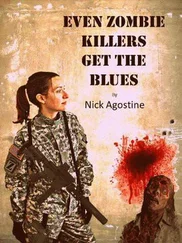I said, “Sorry, Muddy. I had a little accident last night.”
He lowered his eyebrows and peered at me with accusing black eyes while I got out a bag of individually frozen livers from the freezer. When I put one in the microwave to thaw, he whirled around and leaped atop the refrigerator, where he hunkered on his front paws and peered down at me as if I were a bug he might pounce on.
I put the thawed liver in his bowl and left him while I made my house inspection, and by the time I said goodbye, Muddy had calmed down. But his behavior rattled me. Muddy was neurotic, but he was also a cat with a cat’s keen intuition. He knew something was wrong, and he wasn’t sure he trusted me anymore. When a pet doesn’t trust you, it means you’ve lost your emotional equilibrium, that you need to get back to your central self. The question was, Where had my central self gone?
I was backing out of Muddy’s driveway when Guidry called.
“We got a match from IAFIS. Since I gave you a hard time about your woman, I thought I owed you the results. Her name is Jessica Ballantyne. Born in upstate New York, Ph.D.s in both zoology and biogenetics from the University of Maryland. Did fifteen years of germ-warfare research, most of it for the army.” He paused for a nanosecond and added, “Last known address was in London, five years ago.”
Something about that little pause made my inner ears rise. I said, “What is it you’re not telling me?”
I could almost see him doing that inner-mouth chewing thing that people do when they’re not sure they should let their lips say the words that want to be spoken.
“A woman named Jessica Ballantyne died two years ago. Her ashes are buried in the family plot in New York. Her mother says she died on an obscure island in the Indian Ocean where she was doing some kind of secret research for the government.”
“Our government?”
“Yeah, that one. The one that puts people in identity protection programs when there’s been some kind of security breach. The mother sounded bitter, said nobody had ever come clean with the family about the exact nature of Jessica’s death. All they were told is that she contracted a fatal disease and died swiftly. She was cremated on the island and her ashes returned to the family. Or at least somebody’s ashes were.”
“You think—”
“I don’t know what I think, Dixie. This whole case seems like somebody’s idea of a joke. I’m just not sure who the joke’s being played on.”
I said, “Did she ever work for BiZogen Research?”
“Why?”
“Because the house Kurtz lives in is owned by a shell company formed by BiZogen Research.”
There was a long pause. “How do you know this?”
“Ethan Crane told me last night that BiZogen Research built the house. He knows because he was the escrow agent. Tom Hale looked up BiZogen on the internet for me a little while ago.”
Another long pause. “Dixie, it would have been really nice if you’d told me about the BiZogen angle and let me research it.” Guidry’s voice had gone cool and annoyed. “Is there anything else you haven’t told me?”
“Nope, that’s it.”
“Thank God.”
Without even a perfunctory goodbye, he left me holding a silent phone.
Into the air, I said, “But what about the ballistics report on my gun?”
My head hurt. It was full of ideas banging around in it like a crazed pinball machine. I kept thinking about the calico kitten and wishing there was something I could do to prevent Paloma from having it declawed. I wished I had made a stronger case against it. I even considered going back to her house and talking to her again. Not about her husband’s murder, but about her kitten’s claws. Some might say I had a problem with priorities, but that’s how it was. A lot of people don’t realize that declawing a cat is like amputating a human’s toes, with the same destruction of balance and psyche. Even cats who don’t show any effects, cats who seem perfectly fine without their claws, would be a lot more sure-footed with them. People who know that and get their cats declawed anyway because they value their furniture more than their cats should be ashamed of themselves. Veterinarians know better, but a lot of them do the surgery anyway because they don’t want to lose clients who demand it. They should be especially ashamed of themselves.
Probably the only thing that kept me from making a U-turn and following through on the save-the-kitten idea right that minute was that I badly needed to go home and take a nap. Sometime I would go back to Paloma’s house and talk to her again about the kitten. But not now. Now I had to go home.
On the drive home, I slowed at the Kurtz house, where three more sign-carrying marchers had joined the ersatz monk. Two of the signs carried Bible numbers from Revelation in runny red paint. One said, 666—MARK OF THE BEAST.
Under my breath, I said, “Oh, doodles, now I get it. They think the devil lives there.”
I hadn’t given it any thought before, but the street number of Ken Kurtz’s house was 666. In Southwest Florida, where people have been known to run screaming from a store if their purchases total $6.66, that’s a number guaranteed to bring out the loonies.
Behind the marchers, the crime-scene tape was still up, but I didn’t see any cars. I also didn’t see a replacement guard. That meant Ken Kurtz was alone, with only Ziggy for solace and comfort.
Well, tough titty. Kurtz was an intelligent adult with money, and he could call a nursing service if he needed one. He could call the police. He could call friends or relatives. It wasn’t my fault the man was blue and in pain. It wasn’t my fault he was weird or that his guard had been killed or that his nurse had run away or that he had nuts marching in front of his house.
Besides, Paco had been right. If the person who’d called me had an important message for Ken Kurtz, why didn’t he just call him and tell him? All the cloak-and-dagger secrecy was silly, and so was I if I got sucked into it. I had promised to look in on Kurtz and Ziggy once a day, and that was all I was going to do. I would go see Kurtz later and give him the ominous message about Ziggy.
With one last look at the pickets, I drove on, shaking my head. They were too sad to be funny and too funny to be taken seriously.
At the lane leading home, I stopped at the mailbox to scoop out the day’s assortment of pizza ads and offers for discounted lanai cages and haircuts. As I slammed the mailbox door shut, a woman’s firm hand clamped on my wrist.
A husky, authoritative voice said, “I have to talk to you.”
I knew who it was even before my head whipped around and sent stabbing pain down my spine. Without waiting for an invitation, the mystery woman opened the back door and got in.
She said, “Drive,” and from the way she said it, I could almost feel the barrel of a gun pointed at me.
I said, “I’m not taking you to any private place. You want to talk to me, it’ll have to be someplace where there are people.”
“You think I might kill you?”
“Damn right! I think you may have already killed one person, and maybe two.”
In the side rearview mirror, I saw a look of resigned sadness move across her face. “Just don’t go where we can be overheard.”
Feeling like a robot with bad wiring, I pulled back out onto Midnight Pass Road and headed north toward Crescent Beach. We didn’t speak for the entire drive. When I parked by the stairs, we climbed from the parking lot to the pavilion area, where blissful tourists were eating sandwiches and watching the sun sparkle on the waves. I chose a table under the canopied area and took a seat. Swinging her thick dark hair back so it fell behind her shoulders, she sat down opposite me.
Читать дальше












